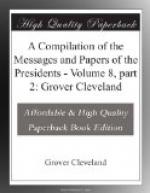These sentiments, which animated the French nation from the dawn of their revolution, have acquired new strength since the foundation of the Republic. France at that time, by the form of its Government, assimilated to, or rather identified with, free people, saw in them only friends and brothers. Long accustomed to regard the American people as her most faithful allies, she has sought to draw closer the ties already formed in the fields of America, under the auspices of victory, over the ruins of tyranny.
The National Convention, the organ of the will of the French nation, have more than once expressed their sentiments to the American people, but above all these burst forth on that august day when the minister of the United States presented to the National Representation the colors of his country. Desiring never to lose recollections as dear to Frenchmen as they must be to Americans, the Convention ordered that these colors should be placed in the hall of their sittings. They had experienced sensations too agreeable not to cause them to be partaken of by their allies, and decreed that to them the national colors should be presented.
Mr. President, I do not doubt their expectation will be fulfilled, and I am convinced that every citizen will receive with a pleasing emotion this flag, elsewhere the terror of the enemies of liberty, here the certain pledge of faithful friendship, especially when they recollect that it guides to combat men who have shared their toils and who were prepared for liberty by aiding them to acquire their own.
P.A. ADET.
Answer of the President of the United States.
UNITED STATES, January 1, 1796.
Born, sir, in a land of liberty; having early learned its value; having engaged in a perilous conflict to defend it; having, in a word, devoted the best years of my life to secure its permanent establishment in my own country, my anxious recollections, my sympathetic feelings, and my best wishes are irresistibly excited whensoever in any country I see an oppressed nation unfurl the banners of freedom. But above all, the events of the French Revolution have produced the deepest solicitude as well as the highest admiration. To call your nation brave were to pronounce but common praise. Wonderful people! Ages to come will read with astonishment the history of your brilliant exploits! I rejoice that the period of your toils and of your immense sacrifices is approaching. I rejoice that the interesting revolutionary movements of so many years have issued in the formation of a constitution designed to give permanency to the great object for which you have contended. I rejoice that liberty, which you have so long embraced with enthusiasm—liberty, of which you have been the invincible defenders—now finds an asylum in the bosom of a regularly organized Government, a Government which, being formed to secure the happiness of the French people, corresponds with the ardent wishes of my heart, while it gratifies the pride of every citizen of the United States by its resemblance to their own. On these glorious events accept, sir, my sincere congratulations.




